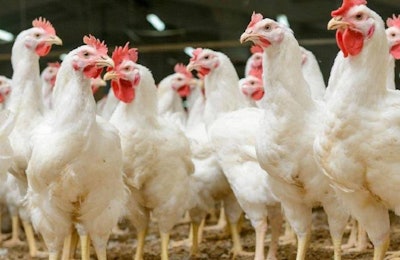
Perdue Foods has announced a renewed focus on animal care, a continuation of its focus on premium, trusted brands that meet evolving consumer expectations. Chairman Jim Perdue shared the company’s commitments to animal care, a four-part plan that will accelerate its progress in animal care, strengthen relationships with farmers, build trust with multiple stakeholder groups and create an animal care culture for continued improvement.
Titled 2016 and Beyond: Next Generation of Perdue Commitments to Animal Care, the plan was developed with input from stakeholders such as farmers, academics and leaders of animal advocate organizations who were invited by Perdue to help shape this progressive animal care plan that sets new industry standards.
“As we continue to learn about innovative and better ways to raise animals through our No Antibiotics Ever journey and our experience in raising organic chickens, we are adopting a four-part plan which will result in changing how we raise chickens,” said Perdue. “Transparency is very important to Perdue consumers, who are interested knowing how we raise, care for and harvest our chickens. Our vision is to be the most trusted name in food and agricultural products and animal care is a big part of that journey.”
“Poultry production as a whole has made great progress in keeping chickens healthy; however, we can improve by implementing policies that go beyond meeting chickens’ basic needs. We want to create an environment where chickens can express normal behaviors,” said Bruce Stewart-Brown, DVM, Perdue’s senior vice president of food safety, quality and live production. “Over the past five years, we’ve been exposed to and learned some husbandry techniques associated with organic production. And, through the brands that have recently joined our company, we’ve been able to learn from some of the pioneers of a more holistic approach to animal well-being. When we talked to farmers they responded very positively to these improved husbandry methods. In addition, we hear from consumers that how animals raised for food are treated is important to them.”
The first major company to commit to implementing such progressive practices in raising and harvesting animals system-wide, Perdue’s Commitments to Animal Care go well beyond most other companies’ commitments to encompass not only the animals but the people who care for and handle them, as well as stakeholders who have an interest in this area.
Perdue’s four commitments to animal care
The Perdue Commitments to Animal Care summarizes current progress and details next generation initiatives for each part of the plan. Perdue is putting program measurements in place, including audits by third parties, and will release an annual report announcing its progress in reaching specific goals.
Specifically the four-part plan commits to:
- The wants and needs of the animals -- Based on The Five Freedoms, an internationally recognized standard for animal husbandry, Perdue’s commitment document lays out where the company is today on each of the five aspects as well as future goals. For instance, the majority of chickens today are raised in fully enclosed barns without natural light. Perdue is committed to retrofitting 200 chicken houses with windows by the end of 2016 to compare bird health and activity to enclosed housing.
- The farmers that raise the chickens -- Appreciating that chickens spend most of their time in the care of farmers, the plan stresses improved relationships with farmers. This includes creating an open dialogue about best practices in animal care, considering the farmer’s well-being and connecting animal care to pay and incentives.
- Openness, transparency and trust -- The plan also calls for Perdue to be open to criticism of its current policies and procedures when deserved, share information about animal care initiatives, and proactively engage with a wide variety of animal welfare stakeholders, including advocates, academics and animal care experts.
- A journey of continuous improvement -- The fourth part of the plan commits to ongoing learning and advancements in the company’s animal care programs to ensure the health and well-being of its birds through next-generation initiatives. This commitment will be driven by Perdue’s active Animal Care Council, which has been in place for more than 15 years.
“Our four commitments have one goal and that is continued improvement in animal care. We know we’re not where we want to be yet but we want to allow others to take the journey with us,” said Stewart-Brown.
“From lessons learned from organic chicken houses, it’s clear that there can be a general health benefit with increased activity—and that is a big focus of our plan. Short-term goals that support increased activity include window installations in 200 existing poultry houses by the end of 2016 and studying the role of enrichments such as perches and bales of hay to encourage activity. Our goal is to double the activity of our chickens in the next three years.”
“I think it’s wonderful that Perdue is taking these initiatives. We’re almost going back in time with what we’re doing, and putting the chickens back in a more natural state. I think we’re moving in the right direction making sure these birds are in a more natural habitat, and they’re more content,” said Georgie Cartanza, a 10-year poultry farmer from Camden, Delaware.
Animal advocacy groups such as Compassion in World Farming, Mercy For Animals and The Humane Society of the United States commended Perdue for taking this major step.
Retailers such as BJ’s Wholesale Club also expressed their support for this initiative.
Perdue and the evolution of Americans’ dinner plates
Perdue stated in a press release that it has quietly excelled at stewardship for years. As consumers increasingly consider the origin of their food, the scale of Perdue’s commitments to animal care will further conversations around responsible food production from the farmer to the consumer, and bring progressive raising practices into the mainstream.
Perdue’s renewed focus on animal care is a continuation of its nearly 100-year history of listening to customers and commitment to meeting consumer expectations for the food they share with their families.
“We are only just getting started. Our animal care plan is not a static document – it is an ongoing journey focused on learning, listening and responding to further advance how we care for animals as well as how we will continue to strengthen our relationship with the farmers who raise our chickens,” said Perdue. “It’s not the cheapest or easiest way to produce food; it’s the Perdue way.”

















